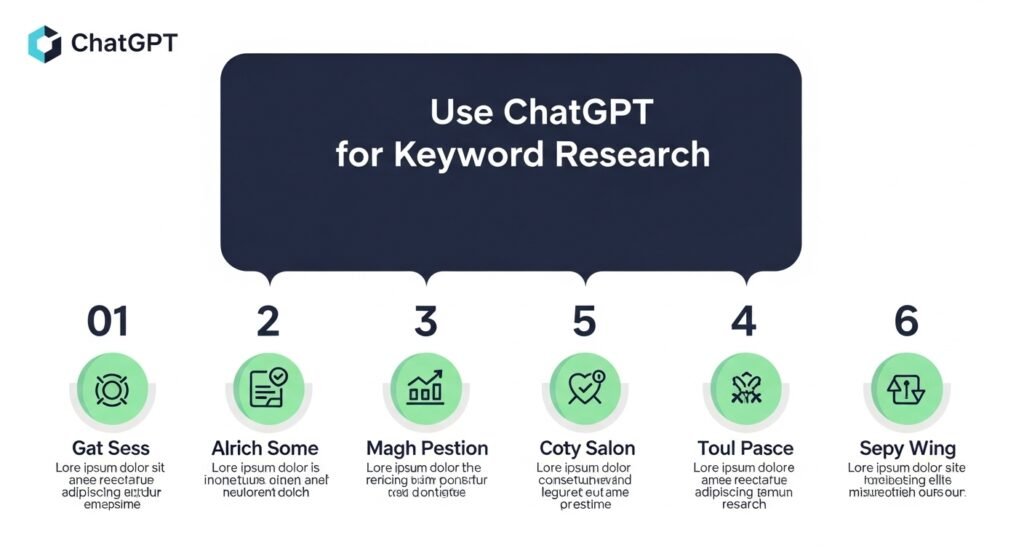Keyword research is the foundation of a successful SEO strategy, helping you understand what your audience searches for and how to create content that ranks well on Google. With the rise of AI tools like ChatGPT, developed by OpenAI, keyword research has become faster and more accessible. While ChatGPT is not a replacement for traditional SEO tools, it can be a powerful ally for generating ideas and understanding user intent.
Keyword research involves identifying and analyzing search terms that people use on search engines like Google. This process helps you create content that aligns with user intent, driving organic traffic to your website. Traditional tools like Google Keyword Planner, Ahrefs, and SEMrush provide critical data such as search volume and keyword difficulty. However, ChatGPT, a conversational AI model, can complement these tools by generating keyword ideas, long-tail phrases, and topic suggestions quickly.
Benefits of Using ChatGPT for Keyword Research
ChatGPT offers several advantages for keyword research, making it a valuable tool for content creators and marketers:
- Fast Idea Generation: ChatGPT can produce a list of relevant keywords in seconds, helping you brainstorm ideas for your content.
- Time Efficiency: It reduces the time spent on manual research, allowing you to focus on strategy and content creation.
- Accessibility: ChatGPT is free to use (with optional paid versions like ChatGPT Plus), making it accessible to beginners and professionals alike.
- Versatility Across Niches: Whether your website focuses on technology, fitness, or finance, ChatGPT can generate keyword ideas tailored to your audience.
Limitations of Using ChatGPT for Keyword Research
While ChatGPT is a powerful tool, it has limitations that you should consider:
- No Real-Time Data: ChatGPT’s knowledge is based on data up to a certain point (e.g., April 2023 for GPT-4), so it may not reflect current search trends as of August 2025.
- Lack of Metrics: It cannot provide search volume, keyword difficulty, or competition data, which are essential for prioritizing keywords.
- Potential Inaccuracies: ChatGPT generates responses based on patterns in its training data, which may lead to irrelevant or outdated keyword suggestions.
- Requires Validation: Keywords generated by ChatGPT must be cross-checked with tools like Google Keyword Planner or Ahrefs to ensure they are effective.
Step-by-Step Guide to Using ChatGPT for Keyword Research

Follow these steps to leverage ChatGPT effectively for keyword research:
1. Identify a Seed Keyword
Start by choosing a broad topic or seed keyword relevant to your niche. For example, if you run a tech blog like Technewscap.com, a seed keyword could be “AI tools.”
2. Generate Related Keywords
Use a prompt to get a list of related keywords. Example prompt:
“Generate a list of keywords related to ‘AI tools’ that people might search for on Google.”
This will produce a broad list of keywords, such as “best AI tools,” “AI tools for productivity,” or “free AI tools.”
3. Find Long-Tail Keywords
Long-tail keywords are specific, less competitive phrases that target niche audiences. Use a prompt like:
“Provide a list of long-tail keywords for ‘AI tools.’”
Example output might include “best AI tools for small businesses” or “free AI tools for content creation.”
4. Discover User Questions and Topics
To understand user intent, ask ChatGPT to generate questions or topics related to your seed keyword. Example prompts:
“What questions do people ask about ‘AI tools’?”
“List topics related to ‘AI tools’ for a tech blog.”
This can reveal questions like “What are the best AI tools for beginners?” or topics like “AI tools for automation.”
5. Cluster Keywords by Intent
Group keywords based on search intent (informational, navigational, transactional, or commercial investigation). Use a prompt like
“Group the following keywords by their search intent.”
This helps you organize keywords into categories for content planning.
6. Validate with Traditional Tools
Use tools like Google Keyword Planner, Ahrefs, or SEMrush to verify the keywords generated by ChatGPT. Check metrics like
- Search Volume: How many people search for the keyword monthly.
- Keyword Difficulty: How hard it is to rank for the keyword.
- Competition: The level of competition for paid ads.
ChatGPT vs. Semrush: Which is Better for SEO in 2025?
Best Practices for Using ChatGPT in Keyword Research
To maximize the effectiveness of ChatGPT, follow these best practices:
- Craft Specific Prompts: Vague prompts yield generic results. Instead of “keywords for AI,” use “keywords for AI tools for small business owners.”
- Use Multiple Prompts: Experiment with different prompts to get a variety of keywords and perspectives. For example, ask for both keywords and questions.
- Validate with Data: Always cross-reference ChatGPT’s output with tools like Google Keyword Planner or Ahrefs to ensure accuracy.
- Stay Current: Supplement ChatGPT’s suggestions with up-to-date data from traditional tools, as its knowledge may not reflect trends as of August 2025.
- Focus on User Intent: Use ChatGPT to uncover what users are searching for, but confirm intent with actual search data from tools like SEMrush.
Addressing Common User Questions
Based on Google’s “People Also Ask” and related searches, here are answers to common questions about using ChatGPT for keyword research:
- Can ChatGPT replace traditional keyword research tools?
No, ChatGPT cannot replace tools like Google Keyword Planner or Ahrefs. It lacks real-time data and metrics like search volume or keyword difficulty. Use it for ideation and pair it with traditional tools for validation. - What are the best prompts for keyword research with ChatGPT?
Effective prompts include:- “Generate a list of keywords related to [seed keyword] that people might search for on Google.”
- “Provide a list of long-tail keywords for [seed keyword].”
- “What questions do people ask about [seed keyword]?”
- “Group the following keywords by their search intent: [list of keywords].”
- How do I validate keywords generated by ChatGPT?
Use tools like Google Keyword Planner, Ahrefs, or SEMrush to check search volume, keyword difficulty, and competition. This ensures the keywords are relevant and worth targeting. - What are the limitations of using ChatGPT for keyword research?
ChatGPT lacks real-time data, cannot provide search metrics, and may generate inaccurate or irrelevant keywords. Always validate its output with traditional tools. - How can I use ChatGPT to find long-tail keywords?
Use prompts like “Provide a list of long-tail keywords for [seed keyword].” Long-tail keywords are ideal for targeting niche audiences with less competition.
How to Make ChatGPT Write Like a Human
Example Prompts and Outputs
Here’s a table of example prompts and their potential outputs for keyword research:
| Prompt | Example Output |
|---|---|
| “Generate a list of keywords related to ‘AI tools’ that people might search for on Google.” | AI tools, best AI tools, AI tools for productivity, free AI tools, AI software for businesses |
| “Provide a list of long-tail keywords for ‘AI tools.’” | Best AI tools for small businesses, free AI tools for content creation, AI tools for data analysis |
| “What questions do people ask about ‘AI tools’?” | What are the best AI tools for beginners? How do AI tools improve productivity? Are there free AI tools available? |
| “Group the following keywords by their search intent: [AI tools, best AI tools, buy AI tools, how to use AI tools].” | – Informational: how to use AI tools – Commercial Investigation: best AI tools – Transactional: buy AI tools – Navigational: AI tools |
Integrating ChatGPT with Your SEO Strategy
To make the most of ChatGPT, integrate it into your broader SEO strategy:
- Combine with Traditional Tools: Use ChatGPT for ideation and tools like SEMrush for data-driven insights.
- Create Content Plans: Use ChatGPT to generate topic clusters and content ideas, then validate them with search data.
- Monitor Trends: Regularly check Google Trends or other tools to ensure your keywords align with current user behavior.
- Optimize for User Intent: Use ChatGPT to identify questions and topics, then create content that directly addresses those needs.
For more insights on integrating AI into your SEO strategy, check out our article on ChatGPT vs. Traditional SEO Tools.
Conclusion
ChatGPT is a powerful tool for keyword research, offering a fast and accessible way to generate keyword ideas and understand user intent. However, its limitations—such as the lack of real-time data and search metrics—mean it should be used alongside traditional SEO tools like Google Keyword Planner, Ahrefs, or SEMrush. By following the steps and best practices outlined in this guide, you can leverage ChatGPT to enhance your keyword research process, create content that resonates with your audience, and improve your SEO performance on Technewscap.com.
